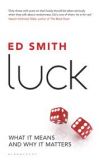
25 Apr 2013 03:58:22
This may sound like a statement of the obvious. But there is more to success than hard work and application, and we should be grateful to Ed Smith for pointing it out in this brief but elegant and resonant book.
Smith's first career was as a cricketer; he applied himself, we learn here, to becoming the best. It was as if he had inhaled Gladwell's book before it had even been written. From the age of four, by his account, he would spend hours in front of the television, watching his hero, Geoffrey Boycott. For those who know little or nothing of cricket, Boycott was an unlikely hero for a child: a batsman who would devote himself single-mindedly to amassing his own score through the application of dry and rigorous technique. Smith could spend hours studying his technique because Boycott stayed in for hours, often to the exasperation even of his team-mates. No bars at cricket grounds ever emptied when the news went round that Boycott had arrived at the crease. He was the archetypal sporting figure who refused to believe in luck. It was all down to technique.
Smith's technique was good enough for him to get picked for England. But after a promising start, he never flourished, and was dropped after only a few games, his final innings closing thanks to a poor umpiring decision. Five years later, he broke his ankle in a freak accident (his physios didn't realise it was broken for some time, and the punishing regime of exercise they imposed makes for uncomfortable reading) and had time to think about the luck he had hitherto disdained.
Consider the Azande tribe of the Sudan, studied in the 1920s by the anthropologist EE Evans-Pritchard: they have no concept of luck at all; every unwelcome event is due to the malicious intent of someone else. A society that assumes that someone else's success must have been not only at your expense, but due to their deliberate ill-will towards you, is not going to be terribly healthy or happy, although it will keep the witch doctors in business. There are several such societies dotted around the place; worryingly, it looks as though we are on the way to becoming one ourselves. As evidence of this trend, Smith cites Rhonda Byrne's self-help bestseller, The Secret, which he describes as "meretricious", and from what he quotes of it here, I would say he is being polite. (The idea is that by thinking about money a lot you become rich. You know the kind of thing.)
It is important that myths like these are exploded: quietly and unfussily (Smith's prose is itself Boycottian, in the best sense: it may not be flashy, but it does its job and it doesn't make mistakes). At one point, he talks to the golfer Colin Montgomerie, who has hit more holes in one than any other player, who points out that luck is hugely important, and, moreover, a hole in one is almost invariably the result of a mistake or, more genteelly put, "a sub-optimal stroke".
I have perhaps overrepresented the degree to which sport informs this book – there is not so much that the sporting illiterate's eyes will glaze over. Smith's humane argument applies to all fields where luck plays a part – more or less everything. To have a corrective to the idea that failure is more often due to weakness than chance is urgently necessary these days. Meanwhile, reflect that both Churchill and Hitler were knocked down by cars in 1931; each could easily have been killed. And yet, of course, they weren't. What are the odds?

